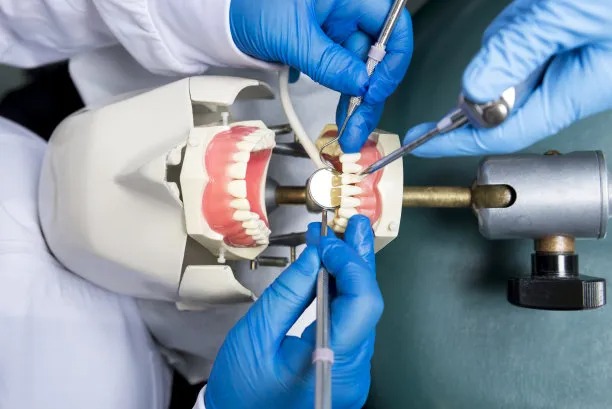Summary: Root canal treatment is a critical procedure that can save a tooth and enhance overall dental health. This article outlines key steps and precautions necessary to ensure safe and effective root canal procedures. By focusing on preparation, sterile techniques, proper instrumentation, and post-treatment care, patients can significantly reduce risks and improve their outcomes. Adhering to these essential steps creates a stable foundation for both patients and dental professionals, promoting the long-term health of the treated tooth. Understanding these aspects not only alleviates anxiety but also empowers individuals to take proactive measures for their dental well-being.
1. Comprehensive Preparation for Treatment

Before undergoing a root canal, thorough preparation is essential for a successful and safe procedure. This begins with a comprehensive dental examination, which includes X-rays to evaluate the extent of the infection or damage to the tooth. Accurate diagnosis helps in planning the treatment effectively, ensuring that the dental professional is well-prepared for what lies ahead.
Communicating openly with your dentist about any medical conditions or medications is pivotal in aiding them to tailor their approach. This transparency allows the dentist to anticipate any complications, such as allergic reactions or interactions with medications that might arise during the procedure.
Finally, understanding the procedure can greatly reduce anxiety. Patients are encouraged to ask their dentist questions about what to expect before, during, and after the treatment. An informed patient is less likely to encounter stress, resulting in a smoother experience during the root canal treatment.
2. Importance of Sterile Techniques
Maintaining a sterile environment is paramount during root canal treatments to prevent infections. Dental professionals should meticulously follow protocols for sterilization of instruments and use barriers, such as gloves and masks, throughout the procedure. These practices not only safeguard the patient but also the dental team from cross-contamination.
Utilizing modern technologies, such as ultrasonic cleaning devices for sterilizing instruments, enhances safety further. Continuous diligence in maintaining a clean workspace contributes to the overall success of the treatment, reducing the chance of postoperative complications.
Moreover, employing rubber dams during the procedure is an essential precaution. This device isolates the tooth, preventing saliva and bacteria from contaminating the treatment area. A clean field allows for thorough cleaning and disinfection of the root canal, which is crucial for effective treatment.
3. Effective Use of Proper Instrumentation
The tools used during a root canal must be chosen wisely to ensure effective treatment. High-quality, well-maintained instruments are key components that contribute to the procedures success. Dentists should regularly check the functionality of their instruments to prevent any complications that may arise due to malfunctioning tools.
Additionally, the use of rotary endodontic files has become increasingly popular due to their efficiency in cleaning and shaping the root canals. These instruments can create smoother walls and reduce the time spent on each procedure without compromising quality, allowing more patients to benefit from timely interventions.
Monitoring the use of proper irrigation solutions during the procedure is crucial, as well. Antimicrobial agents help eliminate bacteria and debris from inside the canal, which significantly impacts the prognosis of the treated tooth. By employing advanced irrigation techniques, dentists can enhance the cleanliness of the canal system, contributing to better healing outcomes for the patient.
4. Post-Treatment Care and Follow-Up
The significance of post-treatment care cannot be overstated in ensuring the success of root canal therapy. After the procedure, patients should follow their dentists aftercare instructions carefully, which may include prescribed medications to manage pain and prevent infections.
Regular follow-up appointments are also vital for monitoring the healing process. These visits allow the dentist to assess whether the tooth is responding well to treatment and identify any potential issues early on. Consistent monitoring fosters ongoing patient safety and promotes optimal dental health.
Furthermore, maintaining good oral hygiene post-treatment will aid in the longevity of the tooth. Patients should adhere to proper brushing and flossing techniques and consider using antimicrobial mouthwash to keep the area clean and prevent reinfection, ensuring the effectiveness of the root canal treatment lasts.
Summary:
The meticulous steps and precautions highlighted throughout this article emphasize the importance of preparation, sterile techniques, proper instrumentation, and post-treatment care in root canal therapy. Focusing on these aspects ensures a safe and effective procedure, promoting optimal dental health for patients.
This article is compiled by Vickong Dental and the content is for reference only.
Vickong Dental
Vickong Dental is a large medical group established in Hong Kong in 2008 by professors from well-known medical universities in Guangdong and Hong Kong, as well as medical doctors from key national '985' universities (including Master's supervisors and senior professors). The chain of branches brings together expert dentists with PhDs and Master's degrees from Hong Kong and Mainland China, committed to providing high-quality dental treatment.
"Vickong Dental Practices the University Motto of 'Healing and Serving Society,' with a Stable Operation for Sixteen Years. It Has Been honored with Hong Kong Enterprise Leaders's Choice,' and is a Global Trusted Implant Center for the Nobel Implant System. Recommended by Hong Kong Metro Broadcast and Guangdong Television, it Serves Customers from Over Thirty Countries and Regions, Gaining the Trust and Favor of Citizens from the Guangdong-Hong Kong-Macau Greater Bay Area and Surrounding Cities.

Thousands of customers' unanimous praise
The most recognized and highly recommended dental service by customers in the Guangdong-Hong Kong-Macau Greater Bay Area
We Ensure You Receive Detailed Care and Attention Here
Hong Kong standards, Shenzhen prices, Your Trusted English-speaking dentists

Vickong Dental Medical-Grade Instrument Disinfection Process
Vickong Dental Medical-Grade Instrument Disinfection Process

Vickong Dental Chain: A Warm and Comfortable Environment for Treatment






Appointment Hours

Q&A
Why choose Vickong Dental?
Vickong Dental practices the university motto 「Medicine to Benefit Society」, with each branch bringing together highly qualified dentists with doctoral and master’s degrees from Hong Kong and the Mainland, and has maintained seventeen years of steady operation。Recipient of 「2024 Hong Kong Enterprise Leaders Brand」, 「2025 Hong Kong Enterprise Leaders Brand」, a Nobel Biocare Global Trusted Implant Center, and a brand recommended by Metro Radio Hong Kong and Guangdong TV。
To date, we have served customers from more than thirty countries and regions,earning exceptionally high word-of-mouth recognition and trusted recommendations from residents across the Guangdong-Hong Kong-Macao Greater Bay Area and surrounding cities
We have eight major branches in Zhuhai、Shenzhen,and a consultation and service assurance center in Hong Kong,so you can book a free consultation at any time for any questions,which is very reassuring.
If I do not accept the quotation after the CT scan, will I be charged??
No! As long as the actual treatment has not started, you will not be charged any fees.
Will there be any additional charges during the treatment process?
No, there won’t be any additional charges. Before treatment begins, we will clearly explain the treatment plan and its corresponding fees. Only after the patient agrees and signs the consent form will we proceed with the dental service.
Can I pay in Hong Kong dollars?
Yes. Vickong Dental accepts payment in Hong Kong dollars. The amount will be converted based on the exchange rate of the day, and the applicable rate will be clearly communicated to you in advance.
Can I reschedule my appointment at any time?
Yes. Please contact us via **WeChat** or **WhatsApp** as early as possible, providing your original appointment time and details, along with your preferred new date and time slot for rescheduling.













